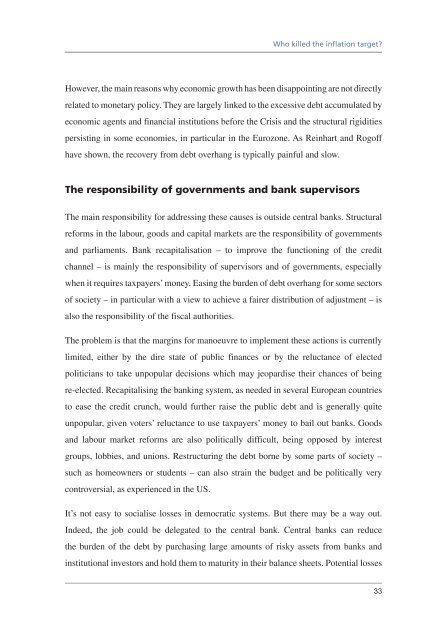Is inflation targeting dead? Central Banking After the Crisis - Vox
Is inflation targeting dead? Central Banking After the Crisis - Vox
Is inflation targeting dead? Central Banking After the Crisis - Vox
You also want an ePaper? Increase the reach of your titles
YUMPU automatically turns print PDFs into web optimized ePapers that Google loves.
Who killed <strong>the</strong> <strong>inflation</strong> target?However, <strong>the</strong> main reasons why economic growth has been disappointing are not directlyrelated to monetary policy. They are largely linked to <strong>the</strong> excessive debt accumulated byeconomic agents and financial institutions before <strong>the</strong> <strong>Crisis</strong> and <strong>the</strong> structural rigiditiespersisting in some economies, in particular in <strong>the</strong> Eurozone. As Reinhart and Rogoffhave shown, <strong>the</strong> recovery from debt overhang is typically painful and slow.The responsibility of governments and bank supervisorsThe main responsibility for addressing <strong>the</strong>se causes is outside central banks. Structuralreforms in <strong>the</strong> labour, goods and capital markets are <strong>the</strong> responsibility of governmentsand parliaments. Bank recapitalisation – to improve <strong>the</strong> functioning of <strong>the</strong> creditchannel – is mainly <strong>the</strong> responsibility of supervisors and of governments, especiallywhen it requires taxpayers’ money. Easing <strong>the</strong> burden of debt overhang for some sectorsof society – in particular with a view to achieve a fairer distribution of adjustment – isalso <strong>the</strong> responsibility of <strong>the</strong> fiscal authorities.The problem is that <strong>the</strong> margins for manoeuvre to implement <strong>the</strong>se actions is currentlylimited, ei<strong>the</strong>r by <strong>the</strong> dire state of public finances or by <strong>the</strong> reluctance of electedpoliticians to take unpopular decisions which may jeopardise <strong>the</strong>ir chances of beingre-elected. Recapitalising <strong>the</strong> banking system, as needed in several European countriesto ease <strong>the</strong> credit crunch, would fur<strong>the</strong>r raise <strong>the</strong> public debt and is generally quiteunpopular, given voters’ reluctance to use taxpayers’ money to bail out banks. Goodsand labour market reforms are also politically difficult, being opposed by interestgroups, lobbies, and unions. Restructuring <strong>the</strong> debt borne by some parts of society –such as homeowners or students – can also strain <strong>the</strong> budget and be politically verycontroversial, as experienced in <strong>the</strong> US.It’s not easy to socialise losses in democratic systems. But <strong>the</strong>re may be a way out.Indeed, <strong>the</strong> job could be delegated to <strong>the</strong> central bank. <strong>Central</strong> banks can reduce<strong>the</strong> burden of <strong>the</strong> debt by purchasing large amounts of risky assets from banks andinstitutional investors and hold <strong>the</strong>m to maturity in <strong>the</strong>ir balance sheets. Potential losses33














